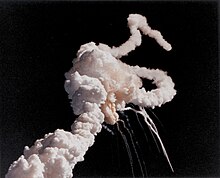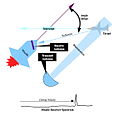The Rocketry Portal

A rocket (from Italian: rocchetto, lit. 'bobbin/spool') is a vehicle that uses jet propulsion to accelerate without using any surrounding air. A rocket engine produces thrust by reaction to exhaust expelled at high speed. Rocket engines work entirely from propellant carried within the vehicle; therefore a rocket can fly in the vacuum of space. Rockets work more efficiently in a vacuum and incur a loss of thrust due to the opposing pressure of the atmosphere.
Multistage rockets are capable of attaining escape velocity from Earth and therefore can achieve unlimited maximum altitude. Compared with airbreathing engines, rockets are lightweight and powerful and capable of generating large accelerations. To control their flight, rockets rely on momentum, airfoils, auxiliary reaction engines, gimballed thrust, momentum wheels, deflection of the exhaust stream, propellant flow, spin, or gravity.
Rockets for military and recreational uses date back to at least 13th-century China. Significant scientific, interplanetary and industrial use did not occur until the 20th century, when rocketry was the enabling technology for the Space Age, including setting foot on the Moon. Rockets are now used for fireworks, missiles and other weaponry, ejection seats, launch vehicles for artificial satellites, human spaceflight, and space exploration.
Chemical rockets are the most common type of high power rocket, typically creating a high speed exhaust by the combustion of fuel with an oxidizer. The stored propellant can be a simple pressurized gas or a single liquid fuel that disassociates in the presence of a catalyst (monopropellant), two liquids that spontaneously react on contact (hypergolic propellants), two liquids that must be ignited to react (like kerosene (RP1) and liquid oxygen, used in most liquid-propellant rockets), a solid combination of fuel with oxidizer (solid fuel), or solid fuel with liquid or gaseous oxidizer (hybrid propellant system). Chemical rockets store a large amount of energy in an easily released form, and can be very dangerous. However, careful design, testing, construction and use minimizes risks. (Full article...)
Selected article -
On January 28, 1986, the Space Shuttle Challenger broke apart 73 seconds into its flight, killing all seven crew members aboard. The spacecraft disintegrated 46,000 feet (14 km) above the Atlantic Ocean, off the coast of Cape Canaveral, Florida, at 11:39 a.m. EST (16:39 UTC). It was the first fatal accident involving an American spacecraft while in flight.
The mission, designated STS-51-L, was the 10th flight for the orbiter and the 25th flight of the Space Shuttle fleet. The crew was scheduled to deploy a communications satellite and study Halley's Comet while they were in orbit, in addition to taking schoolteacher Christa McAuliffe into space under the Teacher In Space program. The latter task resulted in a higher-than-usual media interest in and coverage of the mission; the launch and subsequent disaster were seen live in many schools across the United States. (Full article...)In the news
- 30 June 2024 –
- A Chinese Tianlong-3 rocket is accidentally launched during a static fire test, causing the rocket to crash and explode. No casualties are reported. (CNN)
- 13 June 2024 – Israel–Hamas war
- Hezbollah launches more than 200 rockets at northern Israel. In response, Israeli artillery strikes targets in Yaroun, Hanine, and Yater in southern Lebanon. (The New York Times)
- 12 June 2024 – Israel–Hamas war
- Israel kills three Hezbollah fighters and Taleb Abdullah, a senior commander, in southern Lebanon. Hezbollah retaliates by launching over 250 rockets towards northern Israel, the most the group has sent in the war. (Times of Israel) (Reuters)
Topics
List articles
Things to do
 |
Here are some tasks awaiting attention:
|
Wikimedia
The following Wikimedia Foundation sister projects provide more on this subject:
-
Commons
Free media repository -
Wikibooks
Free textbooks and manuals -
Wikidata
Free knowledge base -
Wikinews
Free-content news -
Wikiquote
Collection of quotations -
Wikisource
Free-content library -
Wikispecies
Directory of species -
Wikiversity
Free learning tools -
Wikivoyage
Free travel guide -
Wiktionary
Dictionary and thesaurus



















































